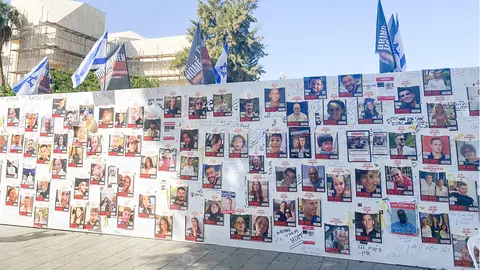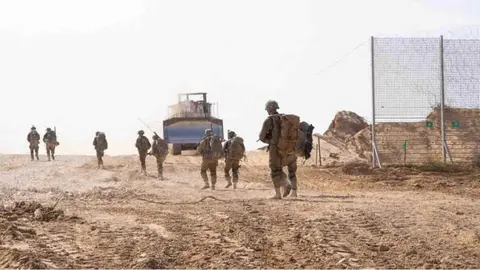US redoubles diplomatic efforts with Qatar to free Hamas hostages

The United States continues to work for the release of the more than 200 Israeli and foreign hostages held by Hamas since 7 October. After Mossad and CIA delegations travelled to Qatar late last week to address this sensitive issue, US President Joe Biden held a telephone conversation with the Qatari emir, Sheikh Tamin bin Hamad Al Thani.
Both leaders "agreed that all hostages should be released immediately", a White House statement said. So far, Hamas has only released four women. In addition to Hamas, other organisations in the Gaza Strip, such as Palestinian Islamic Jihad, are also holding several Israeli citizens hostage.
In the conversation, Biden "unequivocally" condemned Hamas' holding of hostages, including many young children, such as a three-year-old US citizen whose parents were killed on 7 October.
The US president also expressed his hope for the establishment of a future Palestinian state that would allow "Israelis and Palestinians to live side by side with equal measures of stability and dignity".

However, as Biden added, Hamas has long prevented this from happening. Likewise, the terrorist group is also obstructing a prisoner exchange. Osama Hamdan, a senior Hamas official, has demanded from Lebanon a "full exchange" of Hamas prisoners in Israeli jails, ruling out a partial release.
The White House statement did not mention any talk of a possible ceasefire, although Doha has stressed the need for an immediate cessation of hostilities in Gaza, as well as the permanent opening of the Rafah crossing, controlled by the Egyptian authorities.

Qatar's role in the hostage crisis through its influence over Hamas
Qatar is a key actor in this war, as well as in the hostage crisis. Doha has played a key role in the release of the four women because it has influence over Hamas and other Palestinian Islamist groups, with whom it maintains close relations.
In fact, the whole situation is benefiting Qatar and, in particular, Sheikh Al Thani, who is "achieving a higher profile than any other Arab leader in a long time", as Anchal Vohra writes in Foreign Policy. According to the columnist, Al Thani holds the key to the current hostage crisis in the hands of Hamas.

Qatar is one of the few countries that harbours Islamist terrorist groups, including Hamas, along with Israeli business offices and thousands of US troops. However, Doha has always expressed support for the Palestinians and has stopped short of condemning Hamas's massacres of Israeli civilians.
Despite this, Qatar's influence over the terrorist group may be "the only hope" for families whose loved ones are in the hands of Hamas and other terrorist organisations.
The @POTUS pointedly notes to the Emir of Qatar that #Hamas is holding a 3-year old American citizen toddler, whose parents were killed by Hamas on October 7th, hostage. https://t.co/HGvHYu1oy1
— Jason Brodsky (@JasonMBrodsky) November 12, 2023
Al-Shifa hospital, centre of IDF-Hamas fighting
While the US and Israel pursue diplomatic efforts with Qatar to free the hostages, Israeli troops continue their ground operation in the Gaza Strip. The Tsahal says Hamas is losing control of the north of the enclave as evacuations of civilians from the area to the south continue "against the instructions" of the terrorist group.
Fighting between Israeli forces and Hamas is intensifying and Israel has now raised the number of soldiers killed in the ground offensive to 44. On the other hand, the IDF has managed to eliminate dozens of terrorists and has found numerous weapons caches in places such as schools, mosques and residential buildings. Despite the large number of weapons that have been confiscated since Israeli troops entered Gaza, Hamas continues to launch air strikes against Israel, especially against southern communities, many of which have been evacuated.
IDF releases footage of the Navy’s underwater missions unit — known by its Hebrew acronym YALTAM — recovering weapons left behind by Hamas terrorists in the sea from the October 7 onslaught.
— Emanuel (Mannie) Fabian (@manniefabian) November 13, 2023
YALTAM scuba forces scanned the seabed in recent days, finding firearms, explosive… pic.twitter.com/NhW2U0FYH6
The Israeli army has also arrested some 20 Hamas members who will be interrogated in Israel. "The interrogations will be used to obtain updated intelligence from the ground and to assist in the continuation of ground manoeuvres and combat efforts," the Israeli intelligence agency Shin Bet explained.
IDF soldiers locate a Hamas weapons production and storage facility inside a residential building, right next to a children's bedroom.
— Israel War Room (@IsraelWarRoom) November 9, 2023
IDF soldiers discovered a Hamas weapons manufacturing and storage facility used to produce and store UAVs and weapons. The site was located in a… pic.twitter.com/BWQiaH11Fq
Meanwhile, Al-Shifa hospital, Gaza's largest hospital, has become the centre of the fighting, as well as the focus of cross accusations between Israel and Hamas. The IDF announced that it had supplied 300 litres of fuel to the health centre in coordination with its staff, but accused Hamas of preventing the medical centre from accepting it.
The Israeli military has also accused Hamas of having its main base of operations under the hospital, as well as preventing citizens throughout northern Gaza from evacuating the south after IDF warnings.
Report: An exceptional glimpse into the work of the IDF soldiers during a battle with militants. Fighters from the "Harel" reserve brigade stormed a Hamas stronghold, eliminated militants, and destroyed terror infrastructures.#HarelBrigade #IDF #Hamas #CombatOperation pic.twitter.com/47VqsVOEDa
— OSINTwarAlerts (@dopaminedealers) November 12, 2023
Hamas, for its part, blames Israel for "blocking" the hospital and preventing thousands of doctors, patients and displaced persons from leaving, although the army denies this, saying the eastern side of the centre is open to civilians who wish to leave.
Numerous Gazans have managed to leave several hospitals in the north and move south in humanitarian corridors organised by the IDF, which has also announced "tactical pauses in military activities" in the town of Jabaliya.
Thousands of Gazans continue moving south for their safety, using the evacuation corridors opened by the @IDF. Over 200,000 Gazans have done so since November 5.
— COGAT (@cogatonline) November 13, 2023
9:00-16:00 through the Salah Al-Din route toward south of Wadi Gaza. #HumanitarianEfforts pic.twitter.com/bsRpXwhE8y
WHO warns of health situation in Gaza, EU accuses Hamas of using "human shields"
As the fighting intensifies, the humanitarian crisis in Gaza deepens. According to the latest toll from the Hamas-controlled Gaza Ministry of Health, more than 11,000 people have been killed and more than 27,000 injured.
International associations, such as the WHO (World Health Organisation) have also warned of this grave situation, asserting that the health situation in Gaza is "terrible and dangerous". According to its director, Tedros Adhanom Ghebreyesus, the Al-Shifa hospital "no longer functions" as a medical centre, indicating that health workers have been without electricity and water for three days.
.@WHO has managed to get in touch with health professionals at the Al-Shifa hospital in #Gaza.
— Tedros Adhanom Ghebreyesus (@DrTedros) November 12, 2023
The situation is dire and perilous.
It's been 3 days without electricity, without water and with very poor internet which has severely impacted our ability to provide essential…
The EU has condemned the use of hospitals and civilians as "human shields" by Hamas in the war against Israel. Brussels also urged the terrorist group to "immediately and unconditionally release all hostages".
"It is crucial that the International Committee of the Red Cross has access to the hostages," says a joint communiqué from the EU-27, which also calls on Israel to "exercise the utmost restraint to avoid human casualties".
We call on Hamas to immediately & unconditional release all hostages.
— Josep Borrell Fontelles (@JosepBorrellF) November 12, 2023
We condemn the use of hospitals and civilians as human shields by Hamas.
Civilians must be allowed to leave the combat zone. Hostilities are severely impacting hospitals & taking a horrific toll on civilians.
Nasrallah says Hezbollah will continue to attack Israel
In parallel to the war in Gaza, Hezbollah's attacks on northern Israel have intensified in recent days. Recently, several Israel Electric Company workers who were at the border to repair power lines that were damaged in an earlier bombing were injured in one of the latest missile attacks by the Iranian-backed Lebanese Shi'ite group.
BREAKING
— avi scharf (@avischarf) November 13, 2023
2nd straight day of intense fighting as Hezbollah fires anti-tank missiles and heavy shelling of army positions and communities, from the Golan to the Med. now rocket barrages deep into Israel, to Haifa suburbs pic.twitter.com/QBjHqDZyk2
Meanwhile, alarm bells have been sounded in recent hours in places such as Acre, Safed and northern Haifa days after another speech by Hezbollah leader Hassan Nasrallah, who said he would continue to put pressure on Israel. In response to the multiple attacks, the IDF has targeted a cell preparing to launch more rockets and an anti-tank missile squad in southern Lebanon.
Northern Israel hour ago. 1 dead 1 in critical condition another 4 injured after Hezbollah fired an anti tank missile at workers of the Electricity company.
— ElBluemountain #BringThemAllHome (@EBluemountain1) November 12, 2023
There will be no marches in London against Hezbollah
No condemnation from the UN
No NGO will shout war Crimes.
Israel 2023 pic.twitter.com/uSPp0eXiaR
As The Times of Israel recalls, hostilities along the border have resulted in the deaths of three Israeli civilians, as well as the deaths of six soldiers. In Lebanon, on the other hand, more than 80 people have been killed. The toll includes at least 71 Hezbollah members, eight Palestinian terrorists, several civilians and a Reuters journalist.
Americas Coordinator: José Antonio Sierra










